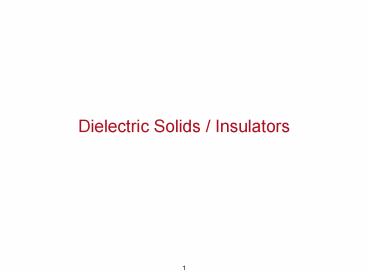Dielectric Solids Insulators - PowerPoint PPT Presentation
1 / 38
Title:
Dielectric Solids Insulators
Description:
High capacitance can be achieved by large A or small d. ... Doping with shallow impurities can also lead to semiconducting behaviour of the dielectrics. ... – PowerPoint PPT presentation
Number of Views:378
Avg rating:3.0/5.0
Title: Dielectric Solids Insulators
1
Dielectric Solids / Insulators
2
Macroscopic description
dielectric susceptibility
3
Plane-plate capacitor
- High capacitance can be achieved by large A or
small d. - Both approaches give rise to several problems.
4
Plane-plate capacitor with dielectric
polarizable units
for the solid
- For any macroscopic Gaussian surface inside the
dielectric, the incoming and outgoing electric
field is identical. - The only place where something macroscopically
relevant happens are the surfaces of the
dielectric
5
Plane-plate capacitor with dielectric
using
capacitance increase by a factor of e
so the E-field decreases by a factor of e
6
The quest for materials with high e
d
l
gate area
required charge to make it work
7
The dielectric constant
8
Microscopic origin electronic polarization
for one atom
for the solid
9
Microscopic origin ionic polarization
10
Microscopic origin orientational polarization
11
The local field
From the measured e can we figure out a?
average field external plus internal
simple but unfortunately also incorrect!
12
The local field
What is the electric field each dipole feels in
a dielectric?
13
The dielectric constant
14
Frequency dependence of the dielectric constant
- Slowly varying fields quasi-static behaviour.
- Fast varying fields polarisation cannot follow
anymore (only electronic polarization can). - Of particular interest is the optical regime.
15
Frequency dependence of the dielectric constant
- Slowly varying fields quasi-static behaviour.
- Fast varying fields polarisation cannot follow
anymore (only electronic). - Of particular interest is the optical regime.
16
Frequency dependence of the dielectric constant
plane wave
complex index of refraction
Maxwell relation
all the interesting physics in in the dielectric
function!
17
Frequency dependence of the dielectric constant
driven and damped harmonic motion
- We obtain an expression for the
frequency-dependent dielectric function as given
by the polarization of the lattice. - The lattice motion is just described as one
harmonic oscillator (times the number of unit
cells in the crystal).
18
(No Transcript)
19
Frequency dependence of the dielectric constant
driven and damped harmonic motion
- We obtain an expression for the
frequency-dependent dielectric function as given
by the polarization of the lattice. - The lattice motion is just described as one
harmonic oscillator (times the number of unit
cells in the crystal). - This model is very simple and very general. It
can be extended to describe electronic
excitations at higher frequencies as well
20
Frequency dependence of the dielectric constant
driven and damped harmonic motion
we start with the usual differential equation
harmonic restoring term
driving field (should be local field)
friction term
21
Frequency dependence of the dielectric constant
driven and damped harmonic motion
22
Frequency dependence of the dielectric constant
driven and damped harmonic motion
atomic part
lattice part
for sufficiently high frequencies we know that
23
Frequency dependence of the dielectric constant
driven and damped harmonic motion
combine
with
to get the complex dielectric function to be
24
Frequency dependence of the dielectric constant
driven and damped harmonic motion
24
25
The meaning of ei
energy dissipation
use
on average the dissipated energy is
26
energy dissipation
27
Frequency dependence of the dielectric constant
28
remember the plasma oscillation in a metal
values for the plasma energy
- We have seen that metals are transparent above
the plasma frequency (in the UV). - This lends itself to a simple interpretation
above the plasma frequency the electrons cannot
keep up with the rapidly changing field and
therefore they cannot keep the metal field-free,
like they do in electrostatics.
29
Impurities in dielectrics
- Single-crystals of wide-gap insulators are
optically transparent (diamond, alumina) - Impurities in the band gap can lead to absorption
of light with a specific frequency - Doping with shallow impurities can also lead to
semiconducting behaviour of the dielectrics. This
is favourable for high-temperature applications
because one does not have to worry about
intrinsic carriers (e.g. in the case of diamond
or more likely SiC)
30
Impurities in dielectrics alumina Al2O3
white sapphire
emerald
topaz
image source wikipedia
amethyst
blue sapphire
ruby
31
Ferroelectrics
- Spontaneous polarization without external field
or stress - Very similar to ferromagnetism in many aspects
alignment of dipoles, domains, ferroelectric
Curie temperature, paraelectric above the Curie
temperature.... - But here direct electric field interactions.
Direct magnetic field interactions were far too
weak to produce ferromagnetism.
32
Example barium titanate
ferroelectric
33
Frequency dependence of the dielectric constant
driven and damped harmonic motion
we start with the usual differential equation
harmonic restoring term
LOCAL field
friction term
34
Applications of ferroelectric materials
- Most ferroelectrics are also piezoelectric (but
not the other way round) and can be applied
accordingly - Ferroelectrics have a high dielectric constant
and can be used to build small capacitors - Ferroelectrics can be switched and used as
non-volotile memory (fast, low-power, many cycles)
35
Piezoelectricity
applying stress gives rise to a polarization
applying an electric field gives rise to strain
36
Piezoelectricity
equilibrium structure no net dipole
applying stress leads finite net dipole
37
Applications (too many to name all....)
- Quartz oscillators in clocks (1 s deviation per
year) and micro-balances (detection in ng range) - microphones, speakers
- positioning mm range (by inchworms) down to 0.01
nm range - most recently, turning kinetic energy of
raindrops into electrical power
38
Dielectric breakdown
- For a very high electric field, the dielectric
becomes conductive. - Mostly by kinetic energy if some free electrons
gather enough kinetic energy to free other
electrons, an avalanche effect sets in (intrinsic
breakdown)































